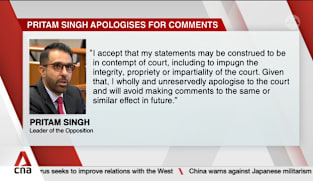Raj Joshua Thomas on Criminal Procedure (Miscellaneous Amendments) Bill
Under a proposed new Sentence for Enhanced Public Protection (SEPP) which would see serious offenders further detained if they are deemed to pose a risk to public safety, there is no longer any certainty as to the period of incarceration, said NMP Raj Joshua Thomas in Parliament on Monday (Feb 5). While the court would pronounce a minimum sentence, the actual period of incarceration may be extended indefinitely by the Law Minister, advised by a panel of experts. Mr Thomas said this jars with his understanding of the larger process of how sentencing comes about. He said Parliament enacts laws that define both offences and the punishments for them. But under the SEPP, an offender could continue to be deprived of his liberty, up to the duration of his natural life, even after he has paid his retributive debt to the state - and the power to do this lies in the hands of the executive, not the judiciary. Mr Thomas asked why the authorities chose not to follow the regime for the safe custody of a person acquitted for unsoundness of mind, under which the minister would have to apply to court for each 12-month extension of custody. He also wanted to know what standard of proof the minister will apply when considering the report of the detention review board, and whether the minister will produce a publicly available report justifying and explaining why an offender should be further confined. Mr Thomas also asked what safeguards are planned to prevent abuse of the proposed expansion of police powers regarding searches without warrants and use of “reasonable force” to carry out Forensic Medical Examinations.
Under a proposed new Sentence for Enhanced Public Protection (SEPP) which would see serious offenders further detained if they are deemed to pose a risk to public safety, there is no longer any certainty as to the period of incarceration, said NMP Raj Joshua Thomas in Parliament on Monday (Feb 5). While the court would pronounce a minimum sentence, the actual period of incarceration may be extended indefinitely by the Law Minister, advised by a panel of experts. Mr Thomas said this jars with his understanding of the larger process of how sentencing comes about. He said Parliament enacts laws that define both offences and the punishments for them. But under the SEPP, an offender could continue to be deprived of his liberty, up to the duration of his natural life, even after he has paid his retributive debt to the state - and the power to do this lies in the hands of the executive, not the judiciary. Mr Thomas asked why the authorities chose not to follow the regime for the safe custody of a person acquitted for unsoundness of mind, under which the minister would have to apply to court for each 12-month extension of custody. He also wanted to know what standard of proof the minister will apply when considering the report of the detention review board, and whether the minister will produce a publicly available report justifying and explaining why an offender should be further confined. Mr Thomas also asked what safeguards are planned to prevent abuse of the proposed expansion of police powers regarding searches without warrants and use of “reasonable force” to carry out Forensic Medical Examinations.



















